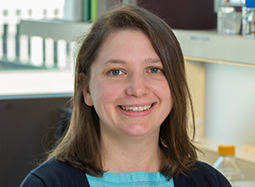Making an early impact: Three questions for Dr. Rochelle Tiedemann
January 10, 2017

The long road from student to independent scientist doesn’t necessarily end with earning a doctoral degree. Just as physicians complete a residency after finishing medical school, newly minted Ph.D.s undergo additional intensive training known as postdoctoral studies to expand and refine their scientific and professional skills. This extended training period gives early career scientists the opportunity to conduct independent research projects while also receiving mentorship from an established scientist, who leads his or her own laboratory.

Dr. Rochelle Tiedemann is one of these early career postdoctoral scholars, and works in the labs of Dr. Peter Jones and Dr. Scott Rothbart, both experts in the field of epigenetics. Rochelle recently received a prestigious American Cancer Society–Michigan Cancer Research Fund postdoctoral fellowship to support her exciting research, which may improve our understanding of the molecular origins of cancer.
Q: Tell us about your research. What will this award support?
RT: We study some of the most basic mechanisms in biology—the way our genes are regulated through epigenetics. Epigenetic controls play incredibly important roles in healthy cells, such as helping to direct and lock in a cell’s ultimate fate—for example, the decision to become a heart cell versus a kidney cell. On the other hand, problems with these controls can contribute to disease; for example, they may misdirect a normal cell to divide uncontrollably, leading to tumors. By understanding how our genes are regulated through epigenetics, we hope to discover new ways to prevent and treat cancer.
Specifically, we’re going to study epigenetic controls at regions of the genome called enhancers. This is tricky, because enhancers can regulate genes located far away in the genome, kind of like having to visit your neighbor’s house to switch on a light in your living room. While we now appreciate that specific epigenetic controls are found at enhancers, our research seeks to understand what they are doing there.
Q: Will your studies focus on a particular disease?
RT: Yes, our studies will use a prostate cancer model system, because some connections between enhancers and the genes they control have been defined in this type of cancer. Importantly, the way enhancers work and are controlled by epigenetics is likely similar in different cell types throughout the body. Therefore, we hope what we find in prostate cancer will be applicable to other cancer types.
Q: What are you most excited about?
RT: This is a big project to undertake with a lot of unknowns. To tackle it, we plan to use some really cutting-edge molecular techniques that will allow us to more precisely map where these controls are located and how they impact gene expression. We have some ideas about what may be going on—I’m looking forward to our results.
On a personal and professional level, receiving this fellowship from the American Cancer Society–Michigan Cancer Research Fund is an honor. Their generous support will help propel our work forward, which we ultimately hope will help us understand cancer at its most basic level. If we can do that, we can find new ways to combat it.
What is epigenetics?
Literally meaning “on top of genetics”, epigenetics are a set of controls that help tell our genes—pieces of the genetic code that contain biological instructions—when to switch on or off. When epigenetic mechanisms go awry, the switches can also be affected, and this contributes to diseases such as cancer.
